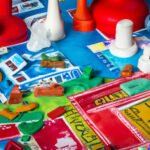Scrabble, the classic board game loved by people of all ages, has captured the hearts and minds of players for decades. Whether you’re a word aficionado or just looking for some good old-fashioned family fun, Scrabble never fails to deliver an entertaining and intellectually stimulating experience. With its simple yet addictive gameplay, this beloved game continues to enchant generation after generation.
The roots of Scrabble can be traced back to the Great Depression, when Alfred Mosher Butts created a game called “Lexiko” with handcrafted letter tiles and a rudimentary scoring system. Over time, the game evolved into what we now know as Scrabble, with its distinctive letter distribution and point values. Since then, it has become a cultural phenomenon and an integral part of countless game nights around the world.
The allure of Scrabble lies in its ability to challenge players mentally and emotionally. As you strategically place letters on the board to form words, you not only enhance your vocabulary but also stimulate your cognitive abilities. Additionally, Scrabble provides an opportunity for social interaction and bonding as friends and family gather around the board to search for high-scoring words and engage in friendly competition.
In this article series, we will delve into the various aspects that make Scrabble so captivating. From its fascinating history to its impact on vocabulary enhancement and mental stimulation, we’ll explore how this timeless classic has remained relevant in the age of technology. We’ll also uncover insider tips and strategies to help you become a Scrabble master, reveal exciting variants that add new twists to the game, and take a closer look at competitive Scrabble championships worldwide.
Join us on this delightful journey as we celebrate the enduring legacy of Scrabble – a game that continues to captivate generations with its charm and timeless appeal.
A Brief History
Scrabble is a beloved classic board game that has been enjoyed by millions of people around the world for decades. This section will delve into the origins and evolution of Scrabble, providing readers with a glimpse into the fascinating history behind this timeless game.
Scrabble was invented in 1933 by an American architect named Alfred Mosher Butts. Originally called “Lexiko” and later “Criss-Cross Words”, Butts created this game as a way to combine his love for crossword puzzles and anagrams. However, it wasn’t until 1948 when James Brunot, a game-loving entrepreneur, discovered Scrabble and saw its potential for success.
Brunot redesigned the game, including changing the name to Scrabble and refining the rules. In 1952, he partnered with the Selchow & Righter Company to produce and distribute Scrabble on a larger scale. The game quickly gained popularity among players of all ages, with families gathering around the board to test their word skills.
Over the years, Scrabble has undergone various changes and amendments. The distribution of tiles was modified in 1953, resulting in a more balanced letter distribution and improving gameplay. In 1984, “double word score” squares were introduced on the board, adding another layer of strategy for players to consider.
Today, Scrabble continues to evolve with new editions that cater to different languages and regions around the world. It has also expanded beyond the traditional board game format, with mobile apps and online platforms allowing people to play against opponents from all over the globe.
| Year | Key Event |
|---|---|
| 1933 | Alfred Mosher Butts invents “Lexiko” |
| 1948 | James Brunot discovers the game and redesigns it as Scrabble |
| 1952 | Selchow & Righter partners with James Brunot to produce and distribute Scrabble |
| 1953 | Tiles distribution is modified for better gameplay |
| 1984 | “Double word score” squares are introduced on the board |
The rich history of Scrabble is a testament to its enduring appeal. From its humble beginnings to worldwide fame, this classic board game has brought joy, excitement, and friendly competition to players of all ages. The next section will explore the rules and gameplay of Scrabble, providing readers with insights on how to play like a pro.
Scrabble Rules and Gameplay
Scrabble is a classic board game that has been enjoyed by people of all ages for decades. This section will explore the rules and gameplay of Scrabble, providing tips and strategies to help players enhance their skills and become pro players.
Rules of Scrabble
To play Scrabble, you need a game board, 100 letter tiles, a tile bag, and one or more opponents. The objective of the game is to score the highest number of points by forming words on the board using your letter tiles. Here are some key rules to keep in mind:
- Starting the Game: Each player randomly selects seven letter tiles from the tile bag to form their initial hand. The first player places their word on the center square of the board (which is always a double word score), ensuring that at least one letter touches an existing tile on the board.
- Creating Words: On their turn, players can either place a word on the board or exchange some or all of their tiles for new ones from the tile bag. When creating words, players can use horizontal or vertical alignments and must connect their word with existing letters on the board.
- Scoring Points: Each letter tile has a specific point value associated with it, ranging from one point for common letters like E and A to ten points for rare letters like Q and Z. Additionally, certain squares on the board are labeled with multipliers that increase the value of specific letters or entire words.
Tips for Winning at Scrabble
While luck does play a role in Scrabble due to its reliance on drawing letter tiles from the bag, there are several strategies that can maximize your chances of winning:
- Build Off Existing Words: Look for opportunities to extend or create new words by utilizing existing letters on the board. This not only helps you score additional points but also limits your opponent’s options.
- Maintain a Good Mix of Letters: Aim to have a balance between vowels and consonants in your hand, as this provides more flexibility for creating words. Holding onto a few high-scoring letters can also give you an advantage.
- Plan Ahead: Anticipate your future moves by considering possible combinations and word placements. This will allow you to make the most strategic plays and potentially block your opponent’s chances of scoring big points.
By following these rules and tips, you can improve your gameplay and increase your chances of winning like a pro in Scrabble. Sharpen your vocabulary, strategy, and critical thinking skills while having a blast with this timeless board game.
The Power of Words
Scrabble is not just a game of strategy and competition; it also has the power to enhance one’s vocabulary. As players try to create words on the Scrabble board, they are constantly challenged to think of new words and expand their language skills. This section explores how playing Scrabble can improve vocabulary and increase word knowledge.
One of the main ways Scrabble enhances vocabulary is through exposure to new words. Players are often introduced to unfamiliar words or uncommon word combinations during gameplay. They have the opportunity to discover and learn these words, which can then be added to their personal lexicon. This exposure to a wide range of words helps players become more well-rounded in terms of language proficiency.
Furthermore, Scrabble encourages players to delve into the depths of their linguistic knowledge by requiring them to think creatively when forming words. Many times, players must experiment with different letter combinations and try out different word variations before finding a valid play. This process often leads players to uncover lesser-known but acceptable words that they may not have previously known.
In addition to expanding vocabulary, Scrabble also helps improve word recall and retention. During gameplay, players are constantly making connections between letters, sounds, and meanings as they construct words on the board. These cognitive processes strengthen memory pathways associated with words, making it easier for players to recall these words in future situations outside of the game.
Overall, playing Scrabble offers an enjoyable way for individuals of all ages to enhance their vocabulary skills. Whether it’s discovering new words, experimenting with word formation, or improving memory recall for existing words, Scrabble provides a valuable opportunity for language growth and enrichment.
| The Power of Words: Scrabble and Vocabulary Enhancement |
|---|
| Scrabble introduces players to unfamiliar or uncommon words |
| Scrabble requires creative thinking to form words |
| Scrabble improves word recall and retention |
Mental Stimulation
Scrabble is not just a fun and entertaining board game, but it also provides numerous cognitive benefits. Playing Scrabble regularly can enhance various aspects of mental stimulation, including memory, language skills, and strategic thinking.
One of the main cognitive benefits of Scrabble is its impact on vocabulary expansion. As players search for high-scoring words within their given tiles, they are constantly exposed to new and challenging words. This exposure helps improve their vocabulary by expanding their knowledge of words and word combinations. In fact, studies have shown that regular engagement with word games like Scrabble can significantly increase a person’s vocabulary size.
Additionally, Scrabble requires players to think strategically and make decisions based on limited information. As players try to maximize their scores by using the highest-scoring words on the board, they must consider factors such as letter distribution, word placement, and the potential for future moves. This level of strategic thinking helps enhance problem-solving skills and decision-making abilities.
Moreover, playing Scrabble regularly can improve memory retention and recall. In order to form words on the board, players must remember both common and uncommon word combinations as well as keep track of those played by opponents. This constant exercise in memory retrieval strengthens the neural connections related to memory in the brain.
Overall, the cognitive benefits of Scrabble make it more than just a leisure activity. It provides an enjoyable way to challenge oneself mentally while improving language skills, strategic thinking abilities, and memory capacity.
| Cognitive Benefits | Description |
|---|---|
| Vocabulary Expansion | Regular engagement with word games like Scrabble can significantly increase a person’s vocabulary size. |
| Strategic Thinking | Scrabble requires players to think strategically and make decisions based on limited information, enhancing problem-solving skills and decision-making abilities. |
| Memory Enhancement | Playing Scrabble regularly strengthens the neural connections related to memory in the brain, improving memory retention and recall. |
The Social Aspect
Scrabble is not just a game for the mind; it is also a game that brings people together. Whether played amongst family members, friends, or even strangers, Scrabble has a unique ability to create connections and foster social interactions. In this section, we will explore the social aspect of Scrabble and how it contributes to its enduring popularity.
Connecting Friends and Family
One of the greatest joys of playing Scrabble is the opportunity it provides for spending quality time with loved ones. Scrabble nights have become a beloved tradition in many households, allowing family members to gather around a table, engage in friendly competition, and create lasting memories.
The game encourages conversation and laughter as players interact while contemplating their next move. Whether it’s reminiscing about past games or simply catching up on each other’s lives, Scrabble has a way of bringing families closer together.
Beyond just family gatherings, Scrabble also serves as a means of connecting friends. From casual get-togethers to game nights with colleagues, Scrabble offers an enjoyable and interactive activity that bridges gaps between individuals. It encourages communication and collaboration as players strategize together, share words they’ve learned recently, or engage in friendly banter during gameplay. The social bonds formed through these shared experiences extend beyond the board itself and can contribute to strengthened friendships.
Building Communities
Scrabble enthusiasts often find themselves becoming part of larger communities centered around the game. Local meetups or clubs dedicated to Scrabble provide opportunities for like-minded individuals to connect and share their love for the game. These gatherings offer both competitive matches and friendly games where players can challenge themselves while also forging new friendships. Some communities even organize tournaments or events where players from various backgrounds come together to showcase their skills and celebrate the spirit of friendly competition.
In recent years, online platforms have further enhanced the social aspect of Scrabble by allowing players from all over the world to connect virtually. These platforms offer various features such as chat functions and multiplayer modes, enabling players to challenge friends or meet new opponents with shared interests. The ability to play Scrabble online has opened up a whole new dimension of social interaction, breaking down geographical barriers and expanding the community of Scrabble enthusiasts.
Scrabble Strategies and Tips
Scrabble isn’t just a game of luck; it’s a game that requires skill, strategy, and a deep understanding of the English language. Whether you’re a newcomer or an experienced player looking to up your game, here are some strategies and tips to help you unlock the secrets to scoring big in Scrabble.
Know Your Tile Values
One key element of strategy in Scrabble is knowing which letters are worth more points. Tiles like “J,” “X,” “Q,” and “Z” have higher point values, so it can be advantageous to play these tiles whenever possible. Additionally, vowels such as “A,” “E,” and “I” are common and can help you connect words more easily.
Build Off Existing Words
Another effective strategy is focusing on building off existing words rather than starting from scratch. Look for open spaces on the board where you can add letters before or after existing words to form new ones. This not only helps you maximize your score but also minimizes your opponent’s chances of using those same spaces.
Learn Two-Letter Words
Knowing a variety of two-letter words is crucial to becoming a successful Scrabble player. There are over 100 acceptable two-letter words in the official Scrabble dictionary, and by familiarizing yourself with them, you’ll have more options for playing tiles strategically when faced with limited space or challenging letter combinations.
Master Word Hooks
Word hooks refer to adding one letter to an existing word on the board to create another word. For example, adding an “S” at the end of “CAT” creates the word “CATS.” By mastering word hooks, you can take advantage of openings on the board and generate additional points from your tiles.
Exchange and Shuffle Tiles
If you find yourself stuck with a hand full of consonants or vowels, don’t hesitate to exchange some of your tiles. Swapping out less useful tiles increases the chances of getting more favorable letters that can lead to higher-scoring moves. Additionally, shuffling your tiles frequently allows you to see different word possibilities and identify potential plays that may have been overlooked.
By incorporating these strategies and tips into your Scrabble gameplay, you’ll be better equipped to score big, challenge opponents, and ultimately become a formidable Scrabble player. Remember, practice makes perfect, so keep honing your skills and expanding your vocabulary to dominate the board in every game of Scrabble.
Scrabble Variants
Official Scrabble Variants
While the classic version of Scrabble is undeniably popular, there are also several official variants of the game that offer a fresh and exciting twist. One of the most well-known variants is Super Scrabble, which includes a larger game board and more tiles than the original game. This allows for longer words and higher scores, making it a thrilling challenge for seasoned Scrabble players.
Another official variant is Speed Scrabble, which adds an element of speed to the gameplay. In this version, instead of taking turns, all players simultaneously race to create their own crossword grids using a shared pool of tiles. The fast-paced nature of Speed Scrabble can be both intense and exhilarating, allowing players to think quickly on their feet.
Customized Scrabble Variants
In addition to the official variants, many enthusiasts have come up with their own customized versions of Scrabble to add even more excitement to the game. One popular variant is Team Scrabble, where players form teams and work together to create words and strategize their moves. This adds a collaborative element to the game and fosters teamwork among players.
Another creative variant is Quiddler Scramble, which combines elements from both Quiddler and Scrabble. Instead of forming one large crossword grid, players aim to create as many point-scoring words as possible within a set time limit using their individual sets of tiles. This variant puts a unique spin on traditional gameplay and challenges players to think creatively in order to maximize their score.
Online Scrabble Variants
With the rise of technology, there are now numerous online platforms that offer different variations of online Scrabble games. These digital versions often incorporate additional features such as timed rounds or themed boards to enhance gameplay further. Online Scrabble also offers the opportunity to play against opponents from all over the world, making it a great way to connect with other Scrabble enthusiasts and test your skills against players of different levels.
Some online platforms also offer multiplayer modes, allowing players to compete against multiple opponents simultaneously. This adds an extra layer of challenge and excitement as players have to keep track of their own tiles while monitoring the moves of their opponents.
Overall, these variants provide a refreshing change of pace for Scrabble enthusiasts and add a new level of fun and excitement to the classic board game. Whether you choose to play the official variants, create your own customized version, or explore the online options available, these twists ensure that there is always something new to discover in the world of Scrabble.
Scrabble Championships and Competitions
Scrabble is not just a casual board game to be enjoyed with friends and family; it has also found its place in the competitive gaming world. Scrabble championships and competitions provide an avenue for passionate players to showcase their skills, strategies, and love for words. These events bring together the best Scrabble players from around the world, creating an atmosphere of excitement and friendly rivalries.
One of the most prestigious Scrabble tournaments is the World Scrabble Championship (WSC). Organized by the World English-Language Scrabble Players Association (WESPA), this annual event has been held since 1991. Players from different countries gather to compete for the title of World Scrabble Champion.
The WSC follows a format where participants play multiple rounds over several days, accumulating points based on their performance in each game. The player with the highest overall score at the end is crowned as the champion.
Aside from the WSC, there are numerous national and regional level Scrabble competitions held around the globe. Countries like the United States have their own national championships, while others organize regional tournaments leading up to international competitions. These events not only provide a platform for players to engage in fierce competition but also foster a sense of community among passionate Scrabble enthusiasts.
Competitive Scrabble requires not only a deep knowledge of words but also strategic thinking and quick decision-making. Players must carefully plan their moves while keeping an eye on both their own score and that of their opponents. This high-pressure environment truly tests players’ abilities and can often lead to surprising outcomes.
From Board Game to Digital
In today’s digital age, it is no surprise that many classic board games have made the transition to the virtual world. Scrabble is no exception. The advent of technology has brought new life to this beloved game, allowing players to enjoy Scrabble in various digital formats.
One of the most popular ways to play Scrabble digitally is through mobile applications. With just a few taps on your smartphone or tablet, you can have access to a virtual Scrabble board and play against opponents from around the world. These apps often come with features such as online multiplayer modes, AI opponents, and even solo challenges to test your skills.
The rise of online gaming platforms has also contributed to the digital presence of Scrabble. Many websites now offer online versions of the game where players can compete against others in real-time. These platforms often include chat functions for players to interact with each other during gameplay, creating a social aspect similar to playing in person.
Aside from mobile apps and online platforms, there are also dedicated Scrabble programs available for computers. These programs not only facilitate gameplay but also offer features such as word suggestions and anagram finders to help players improve their strategy and expand their vocabulary.
While the transition from board game to digital format may seem like a drastic change, it has undeniably opened up new possibilities for enjoying Scrabble. Whether you prefer traditional face-to-face matches or the convenience of playing on your device, there is no doubt that Scrabble in the age of technology offers countless hours of entertainment while still retaining its timeless charm and appeal.
The Enduring Legacy
Scrabble has truly proven its enduring legacy and continues to captivate generations for several reasons. Firstly, the game’s timeless charm lies in its ability to bring people together and foster social connections. Whether played with family members, friends, or even strangers at competitions, Scrabble has a way of creating meaningful interactions and forming lasting memories. The competitive nature of the game adds an extra layer of excitement and engagement, making it a favorite choice for social gatherings.
Moreover, Scrabble is not just about having fun; it also provides numerous cognitive benefits. The game requires players to think strategically, analyze possibilities, and make quick decisions, thereby enhancing critical thinking skills. Additionally, Scrabble helps expand vocabulary by encouraging players to seek out and learn new words. This mental stimulation can have long-lasting effects on language skills and overall cognitive development.
The longevity of Scrabble can also be attributed to its ability to adapt and evolve with changing times. From traditional board game format to various digital versions available today, Scrabble has successfully made the transition into the age of technology while still retaining its core essence. By embracing new platforms and reaching wider audiences, Scrabble ensures that it remains relevant and accessible to players of all ages.
In conclusion, Scrabble’s enduring legacy lies in its ability to bring people together socially while providing mental stimulation and cognitive benefits. Its adaptability to modern technology further ensures its continued popularity across generations. With its rich history, engaging gameplay strategies, and exciting variants, it is no wonder that Scrabble continues to captivate both young and old alike.

I love playing all kinds of games – from classics like Monopoly to modern favourites like Ticket to Ride.
I created this blog as a way to share my love of board games with others, and provide information on the latest releases and news in the industry.





